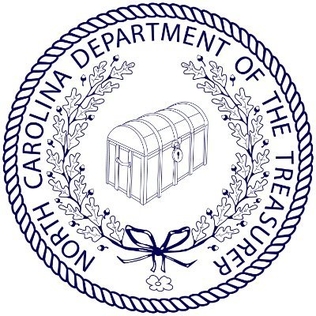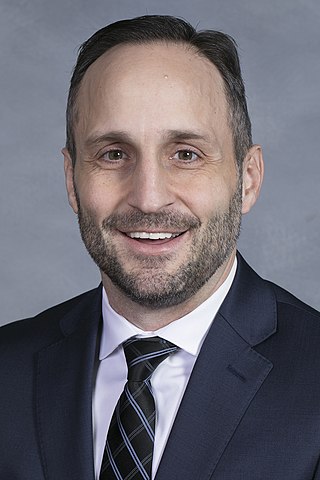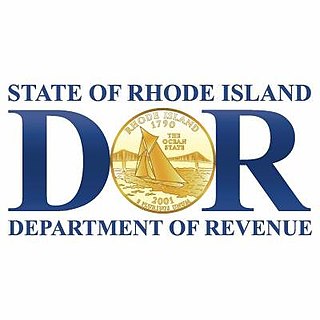
The governor of North Carolina is the head of government of the U.S. state of North Carolina. Seventy-five people have held the office since its inception in 1776. The governor serves a term of four years and chairs the collective body of the state's elected executive officials, the Council of State. The governor's powers and responsibilities are prescribed by the state constitution and by law. They serve as the North Carolina's chief executive and are tasked by the constitution with faithfully carrying out the laws of the state. They are ex officio commander in chief of the North Carolina National Guard and director of the state budget. The office has extensive powers of appointment of executive branch officials, some judges, and members of boards and commissions. Governors are also empowered to grant pardons and veto legislation.

The Inland Revenue was, until April 2005, a department of the British Government responsible for the collection of direct taxation, including income tax, national insurance contributions, capital gains tax, inheritance tax, corporation tax, petroleum revenue tax and stamp duty. More recently, the Inland Revenue also administered the Tax Credits schemes, whereby monies, such as Working Tax Credit (WTC) and Child Tax Credit (CTC), are paid by the Government into a recipient's bank account or as part of their wages. The Inland Revenue was also responsible for the payment of child benefit.

The North Carolina Council of State is the collective body of ten elective executive offices in the state government of North Carolina, all of which are established by the state constitution. The Council of State includes the Governor, Lieutenant Governor, Secretary of State, State Auditor, Treasurer, Superintendent of Public Instruction, Attorney General, Commissioner of Agriculture, Commissioner of Labor, and Commissioner of Insurance. Together with the North Carolina Cabinet and several independent agencies, the Council of State offices constitute the executive branch of North Carolina's state government.

The North Carolina Secretary of State is an elected constitutional officer in the executive branch of the government of the U.S. state of North Carolina, and is fourth in the line of succession to the office of Governor of North Carolina. The secretary maintains the official journal of the North Carolina General Assembly and is responsible for overseeing land records, chartering corporations, and administering some commercial regulations. The incumbent is Elaine Marshall, a Democrat and the first woman elected to the office.

The North Carolina State Treasurer is a statewide elected office in the U.S. state of North Carolina responsible for overseeing the financial operations of state government. The current state treasurer is Dale Folwell.
The Australian Taxation Office (ATO) is an Australian statutory agency and the principal revenue collection body for the Australian Government. The ATO has responsibility for administering the Australian federal taxation system, superannuation legislation, and other associated matters. Responsibility for the operations of the ATO are within the portfolio of the Treasurer of Australia and the Treasury.
A deputy commissioner is a police, income tax or administrative official in many countries. The rank is commonplace in police forces of Commonwealth countries, usually ranking below the Commissioner.

The Oklahoma Department of Transportation (ODOT) is an agency of the government of Oklahoma responsible for the construction and maintenance of the state's transportation infrastructure. Under the leadership of the Oklahoma secretary of transportation and ODOT executive director, the department maintains public infrastructure that includes highways and state-owned railroads and administers programs for county roads, city streets, public transit, passenger rail, waterways and active transportation. Along with the Oklahoma Turnpike Authority, the department is the primary infrastructure construction and maintenance agency of the State.

The Commissioner of Insurance is a statewide elected office in the U.S. state of North Carolina. The commissioner is a constitutional officer who leads the state's Department of Insurance. The commissioner also oversees the Office of the State Fire Marshal and sits on the North Carolina Council of State. The current commissioner is Mike Causey, who has held that office since January 1, 2017.

The Commissioner of Labor is a statewide elected office in the U.S. state of North Carolina. The commissioner is a constitutional officer who leads the state's Department of Labor. North Carolina's general statues provide the commissioner with wide-ranging regulatory and enforcement powers to tend to the welfare of the state's workforce. They also sit on the North Carolina Council of State. The incumbent is Josh Dobson, who has served since January 2021.

The Indian Revenue Service, often abbreviated as IRS, is an Indian government agency that is primarily responsible for collecting and administering direct and indirect taxes. As a central civil service under Group A of the executive branch of the Government of India, it functions under the Department of Revenue of the Ministry of Finance and is under the administrative direction of the Revenue Secretary and the ministerial command of the Minister of Finance.
West Bengal Civil Service (Executive), popularly known as W.B.C.S.(Exe.), is the civil service of the Indian state of West Bengal. For the WBCS (Exe) and other comparative posts, Public Service Commission of West Bengal arranges competitive examinations in three phases every year. These phases are Preliminary, Mains and Personality Test. WBCS is considered to be the premium public service in the state of West Bengal.

The Wisconsin Department of Revenue (DOR) is an agency of the Wisconsin state government responsible for the administration of all tax laws, as well as valuing property and overseeing the wholesale distribution of alcoholic beverages and enforcement of liquor laws. The Department also administers the state's unclaimed property program and the state lottery.

The Royal Malaysian Customs Department is a government department body under the Malaysian Ministry of Finance. RMCD functions as the country's main indirect tax collector, facilitating trade and enforcing laws. The top management of JKDM is led by the Director General of Customs and assisted by 3 deputies, namely, the Deputy Director General of Customs Enforcement/Compliance Division, the Deputy Director General of Customs Customs/Inland Tax Division and the Deputy Chief Director of Customs Management Division. The Royal Malaysian Customs Department consists of several divisions, namely the Enforcement Division, the Inland Tax Division, the Compliance Division, the Customs Division, and the Technical Services Division.

Taxes in Indiana are almost entirely authorized at the state level, although the revenue is used to fund both local and state level government. The state of Indiana's income comes from four primary tax areas. Most state level income is from a sales tax of 7% and a flat state income tax of 3.23%. The state also collects an additional income tax for the 92 counties. Local governments are funded by a property tax that is the sum of rates set by local boards, but the total rate must be approved by the Indiana General Assembly before it can be imposed. Residential property tax rates are capped at maximum of 1% of property value. Excise tax is the fourth form of taxation and is charged on motor vehicles, alcohol, tobacco, gasoline, and certain other forms of movable property; most of the proceeds are used to fund state and local roads and health programs. The Indiana Department of Revenue collects all taxes and pays them out to the appropriate agencies and municipalities. The Indiana Tax Court deals with all tax disputes issues, but decisions can be appealed to the Indiana Supreme Court.

The Internal Revenue Service (IRS) is the revenue service for the United States federal government, which is responsible for collecting U.S. federal taxes and administering the Internal Revenue Code, the main body of the federal statutory tax law. It is an agency of the Department of the Treasury and led by the Commissioner of Internal Revenue, who is appointed to a five-year term by the President of the United States. The duties of the IRS include providing tax assistance to taxpayers; pursuing and resolving instances of erroneous or fraudulent tax filings; and overseeing various benefits programs, including the Affordable Care Act.

The government of North Carolina is divided into three branches: executive, legislative, and judicial. These consist of the Council of State, the bicameral legislature, and the state court system. The Constitution of North Carolina delineates the structure and function of the state government.

South Carolina government and politics covers the three different branches of government, as well as the state constitution, law enforcement agencies, federal representation, state finances, and state taxes. South Carolina is a state in the United States of America and was the eighth admitted to the Union. The state of South Carolina was preceded by the Crown Colony of South Carolina, a constitutional monarchy which was overthrown during the American Revolution. Presently, South Carolina's government is formed as a representative democracy.

The Rhode Island Department of Revenue (RIDOR) is a state agency of Rhode Island responsible for collection of taxes and distribution of state revenue, as well as administration of state laws governing driver licensing, and motor vehicle sale and registration. The current Director of the Department of Revenue is Guillermo Tello, appointed by Governor Dan McKee on May 4, 2021.
West Bengal Revenue Service (WBRS) is one of the Group A services under West Bengal Civil Services, recruited through a competitive examination conducted by West Bengal Public Service Commission. The service was created in 2017 merging four erstwhile services concerning revenue matter and revenue collection.It functions under the Revenue Branch and overall administrative control of Department of Finance.


















